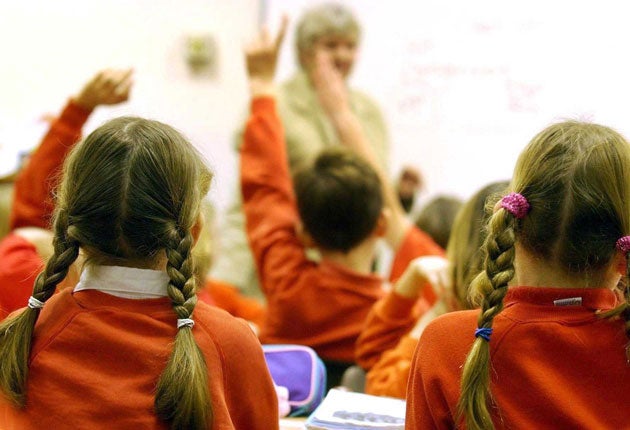British children reluctant to cheat, US study shows
Despite designing a study to lure the youngsters into peeking at the answer to a trivia question, the vast majority of the British children refused to cheat

Your support helps us to tell the story
From reproductive rights to climate change to Big Tech, The Independent is on the ground when the story is developing. Whether it's investigating the financials of Elon Musk's pro-Trump PAC or producing our latest documentary, 'The A Word', which shines a light on the American women fighting for reproductive rights, we know how important it is to parse out the facts from the messaging.
At such a critical moment in US history, we need reporters on the ground. Your donation allows us to keep sending journalists to speak to both sides of the story.
The Independent is trusted by Americans across the entire political spectrum. And unlike many other quality news outlets, we choose not to lock Americans out of our reporting and analysis with paywalls. We believe quality journalism should be available to everyone, paid for by those who can afford it.
Your support makes all the difference.The idea that the British have an inherent sense of fair play is met with scorn by those who view it as nothing more than nationalist myth-making.
However, psychologists researching links between the development of memory in young children and their ability to lie hit a problem when studying six- and seven-year-olds in the UK.
Despite specifically designing a study to lure the youngsters into peeking at the answer to a trivia question – so their skills of deception could then be put to the test – the vast majority of the British children refused to cheat.
Based on studies mainly in North America, about two-thirds were expected to sneak a look at the right answer when the researcher left the room, but less than 25 per cent of the British children actually did so.
Dr Tracy Alloway, of North Florida University, who led the research, told The Independent that they now planned to try to find out why so few took the bait.
“A great follow-up study we’re interested in pursuing is looking at cultural differences,” she said.
“Part of [the propensity to lie] is your social network. One of your siblings will tell on you, you get caught out and eventually no one wants to be friends with someone who’s constantly telling lies. A smart child who’s socially aware will stop pursuing these kinds of behaviours.”
However their findings might not necessarily support the idea that this process is somehow stronger in Britain than elsewhere.
“Being British, I’d love to agree with you, but I’m not sure that’s entirely true,” Dr Alloway said.
One theory is that the word “peeking” – the children were told not to do this by the researcher – has a stronger negative connotation in Britain than in the US and Canada.
Dr Alloway also said the British children may have been more concerned they would be caught. Rather than being in a quiet laboratory, they were tested in a classroom and Dr Alloway said noise in the hall outside may have spooked potential cheaters.
“You could see from the [hidden camera] videos that the children were constantly looking around when they did actually look at the card. They would look very surreptitiously,” she said.
The study, published in the Journal of Experimental Child Psychology, found a link between a better verbal working memory and the ability to lie convincingly.
Dr Ross Alloway, a co-author of the study and Dr Alloway’s husband, said: “Parents may sometimes become frustrated when their child lies about sticking their hand in a cookie jar, but we can take heart that the more believable the explanation for the crumbs around their mouth, the more intelligent they are.”
Join our commenting forum
Join thought-provoking conversations, follow other Independent readers and see their replies
0Comments